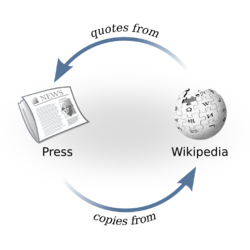Wikipedia/Reliability
 | |
| Wikipedia deems some information sources as "reliable" and some as "unreliable", which provide an easy mechanism for blacklisting anyone who contradicts or questions the concensus trance promoted by commercially-controlled media. This website, by contrast, insists that wherever the source, information should be subject to critical scrutiny. |
Wikipedia's reliability is patchy. Its guidelines ensure that those people and institutions capable of using commercially-controlled media to spread lies will receive effective support in this effort from Wikipedia.
Contents
Guidelines
Wikipedia explicitly seeks to exclude opinions which are free from hierarchical control; its guidelines on reliability state that "The proper uses of a questionable source are very limited" which sounds reasonable until we note the definition of a 'questionable source'- "those with a poor reputation for checking the facts, or with no editorial oversight." At a stroke, individuals are out, organisations are in, especially those which promulgate the official narrative.
"Reliable" sites
So, Wikipedia's definition of reliable sources means that anyone who is wealthy or influential enough to communicate their message through the commercially-controlled media may ipso facto also tell their story on Wikipedia. Those who have less influence over big media have correspondingly less influence over Wikipedia. Blogs, say the reliability guidelines, "may be acceptable as sources so long as the writers are professional journalists or are professionals in the field on which they write and the blog is subject to the news outlet's full editorial control." [1]
"Unreliable" sites
Wikipedia deems certain sites unreliable (including this website). So for example, in 2019 an editor quickly reverted an addition to the list Bilderberg visitors, even though it cited their inclusion in the Bilderberg guest list.[2] The editor did not challenge the authenticity of the reports (which are available in hardcopy in various public libraries), merely claimed that the sites was not reliable. This is equivant to an ad hominem attack in debate, invocation of an enemy image in a debate to distract from the factual evidence presented. The converse policy is also in evidence - citations of "reliable" sources are welcomed without sufficient critical enquiry.
Flexibility
Sites do change from "reliable" to "unreliable" (e.g. The Daily Mail, a UK corporate media outlet).
Persistence of deliberately introduced mistakes
The claim that the "wisdom of crowds" ensures accuracy is unproven.[3] Sceptics of the 9-11 official narrative may wish to reflect on the implications of the fact that, even as it is becoming a minority opinion around the world, it continues to dominate the Wikipedia page.
Related Quotation
| Page | Quote | Author | Date |
|---|---|---|---|
| Quotation | “The problem with internet quotes is that you cant [sic.] always depend on their accuracy” | Abraham Lincoln | 1864 |
References
- ↑ Wikipedia's definition of "Reliable Sources"
- ↑ https://en.wikipedia.org/w/index.php?title=List_of_Bilderberg_participants&type=revision&diff=895630446&oldid=895503080
- ↑ A simple experiment by Adrian Hänni revealed that deliberately introduced errors can persist for months.